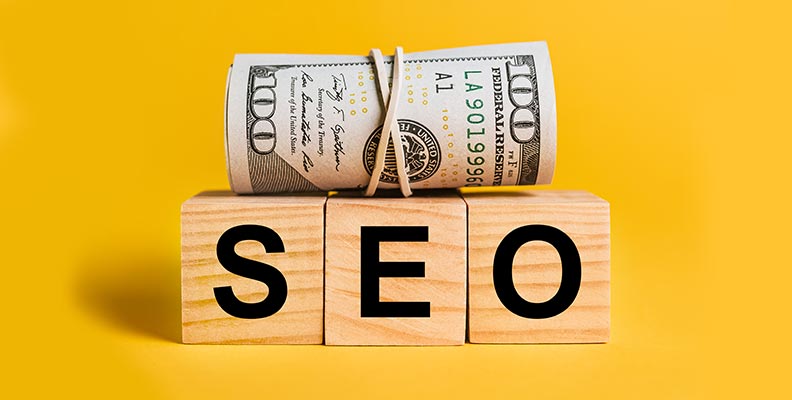Revamping your website is a crucial step in staying ahead of the digital game. Whether you’re starting a new business or looking to revitalize your online presence, a website redesign can be the key to attracting more customers and boosting conversions. But before diving headfirst into this exciting endeavor, it’s essential to understand the various factors that influence website redesign costs. By breaking down these numbers, you’ll gain insights on how to make informed decisions about budgeting and ensuring a successful transformation for your online platform. So let’s dive right in and unravel the mysteries behind website redesign costs!

Your website is the virtual face of your business, and first impressions matter. In today’s fast-paced digital world, where attention spans are shrinking by the second, having an outdated or poorly designed website can be detrimental to your online success. A website redesign breathes new life into your online presence, making it visually appealing and user-friendly.
One of the primary reasons why a website redesign is crucial is because it enhances functionality. As technology evolves, so do user expectations. Your site needs to adapt to these changes in order to provide a seamless browsing experience across multiple devices and platforms.
A well-designed website also improves user engagement. By optimizing navigation, streamlining content, and incorporating interactive elements like videos and animations, you can captivate visitors’ attention and encourage them to explore further.
Furthermore, a modernized website helps build trust with potential customers. When people land on a professional-looking site that reflects your brand identity accurately, they are more likely to perceive your business as credible and trustworthy.
Moreover, investing in website redesign services can also positively impact search engine rankings. Search engines favor websites that are mobile-friendly, have fast loading times, and have high-quality content – all factors that can be improved through a redesign.
Consider this: if your competitors have recently undergone a successful website revamp while you’re stuck in the past with an outdated design or clunky functionalities – who do you think potential customers will choose? Stay competitive by embracing change through regular updates and improvements to keep up with evolving market trends.

When it comes to website redesign services, there are several factors that can influence the overall cost. Understanding these factors is crucial for businesses looking to undertake a redesign project while staying within budget.
The complexity of the design and development process plays a significant role in determining the cost of a website redesign. Custom designs, intricate functionalities, and advanced features require more time and resources from designers and developers, resulting in higher costs.
Creating high-quality content is essential for engaging visitors and improving search engine rankings. The cost of content creation depends on factors such as the amount of content needed, its complexity (e.g., blog posts vs. interactive videos), and whether professional copywriters or freelancers are hired.
An effective website redesign involves optimizing the site’s structure, meta tags, keywords, and other elements to improve visibility in search engines. This may require hiring an SEO specialist or agency to conduct keyword research, implement on-page optimization techniques, develop backlink strategies, etc., which can add to the overall cost.
After launching a redesigned website successfully, ongoing maintenance will be necessary to keep it up-to-date with security updates or new functionality additions. Depending on your needs, you may need technical support services from web developers or pay for hosting fees that provide regular backups.
These are just some of the key factors that can influence website redesign costs. By understanding these variables upfront, businesses can better plan their budgeting strategy when undertaking this important endeavor.

When it comes to website redesign costs, one of the major factors that can influence the overall price tag is the design and development process. This includes everything from creating a visually appealing layout to implementing user-friendly navigation.
Hiring a professional web designer or agency is crucial for achieving a polished and modern look for your website. Their expertise in graphic design, typography, color theory, and UI/UX will ensure that your site not only looks great but also functions seamlessly.
Next, there are development expenses to consider. This involves coding and programming the backend of your website to bring it to life. The complexity of your desired features or functionalities will play a role in determining these costs.
Additionally, if you require customizations or integrations with third-party tools such as e-commerce platforms or customer relationship management systems, this may incur additional expenses.
It’s important to note that investing in quality design and development is essential for creating a professional online presence that aligns with your brand image. Cutting corners here could result in an unappealing user experience and potentially drive visitors away from your site.
Remember: A well-designed and functional website can be instrumental in attracting new customers and growing your business online! So make sure you allocate sufficient resources towards this aspect of your Business Website Redesign project

When it comes to website redesign, one of the key factors that can significantly impact costs is content creation and management. Content plays a crucial role in attracting visitors, engaging them, and ultimately converting them into customers. Therefore, investing in high-quality content is essential for a successful website redesign.
Creating new content involves various tasks such as conducting keyword research, writing compelling copy, designing visually appealing graphics or videos, and organizing the information in a user-friendly way. Each of these tasks requires time and expertise from skilled professionals.
Additionally, managing the content on your website also incurs costs. This includes regular updates to keep your site fresh and relevant, ensuring all links are working correctly, optimizing images for faster loading speeds, monitoring user engagement metrics to identify areas for improvement – the list goes on!
To keep content creation and management costs within budget during a website redesign project:
Remember that investing in quality content pays off in terms of improved search engine rankings, increased organic traffic, and higher conversion rates. So when planning your website redesign budget, don’t overlook the importance of allocating funds towards expertly crafted content and efficient content management strategies!

When it comes to website redesign, one crucial factor that influences the costs is SEO (Search Engine Optimization) and marketing expenses. Optimizing your website for search engines is essential to improve its visibility and attract organic traffic. However, this process requires expertise and ongoing efforts.
To begin with, keyword research plays a significant role in determining SEO expenses. Finding the right keywords that align with your business goals can help drive targeted traffic to your redesigned website. This involves analyzing search volume, competition levels, and relevancy.
Another aspect of SEO is on-page optimization. This includes optimizing meta tags, headers, URLs, and internal linking structures to enhance your website’s ranking potential. Additionally, creating high-quality content optimized for specific keywords can also impact the overall cost of your redesign project.
Off-page optimization strategies such as link building are equally important but may require additional investment. Building reputable backlinks from authoritative websites can boost your site’s credibility in search engine algorithms.
Besides SEO expenses, marketing efforts should not be overlooked during a website redesign project. Promoting your revamped site through various channels like social media advertising or email marketing campaigns could incur additional costs. Remember that investing in SEO and marketing during a redesign will yield long-term benefits by driving more relevant traffic to your site and increasing conversions over time.
While these factors influence the overall cost of a website redesign project significantly, it’s important to note that every business has unique requirements that may result in varying expenses. By carefully considering each element discussed – design & development fees; content creation & management costs; SEO & marketing expenses – you can make informed decisions about where best to allocate resources within budget constraints.

Once your website redesign is complete, it’s important to factor in ongoing maintenance and support fees. While these costs may not be as upfront as design and development expenses, they are crucial for the long-term success of your website.
Regular maintenance ensures that your site remains secure, up-to-date, and functioning optimally. This includes tasks such as software updates, bug fixes, security patches, and server maintenance. These activities help prevent downtime or technical issues that could negatively impact user experience.
Support fees cover the assistance you receive from a web development team or agency after the redesign is complete. This can include troubleshooting problems, and making minor content updates or changes to functionality if needed.
The cost of maintenance and support will vary depending on factors like the complexity of your website and the level of support required. It’s essential to discuss these details with your web developer so you have a clear understanding of what services are included in their package.
While it may be tempting to cut costs by skimping on ongoing maintenance and support, doing so can lead to bigger problems down the line. Investing in regular upkeep will help keep your website running smoothly while providing peace of mind knowing that any issues can be dealt with promptly by professionals.
Factoring in ongoing maintenance and support fees is vital when considering the total cost of a website redesign project. Don’t overlook this aspect as it plays a critical role in keeping your site secure, functional, and up-to-date over time!

Tips for Keeping Website Redesign Costs Within Budget
By following these tips, you can keep your website redesign costs within budget while still achieving an effective online presence that meets your business’s needs!

Website redesign is an essential investment for businesses looking to stay competitive in the ever-evolving digital landscape. However, it’s important to carefully consider the factors that influence website redesign costs and take steps to keep them within budget.
Design and development expenses can vary depending on the complexity of your desired design and functionality. Working with a professional web design agency can ensure a high-quality result, but it’s crucial to communicate your goals clearly from the beginning to avoid unnecessary revisions.
Content creation and management costs should not be overlooked. High-quality content plays a pivotal role in attracting and engaging visitors, so investing in skilled writers or content marketing services is worth considering.
SEO and marketing expenses are vital for driving traffic and increasing visibility. Collaborating with SEO experts can help optimize your website for search engines, improve rankings, and generate organic traffic over time. Additionally, allocating resources for online advertising campaigns can yield significant returns.
Maintenance and support fees should also be factored into your website redesign budget. Websites require ongoing updates, security measures, bug fixes, and technical support to ensure optimal performance. Consulting with web developers who offer maintenance packages will help you plan accordingly.
In conclusion, understanding the various factors that influence website redesign costs is crucial when planning a revamp of your business website. By carefully considering design and development expenses, content creation and management costs, SEO and marketing expenses, and maintenance and support fees, you can create a realistic budget that aligns with your goals.
With proper planning and effective communication, you can achieve successful website redesign services that add value to your business while keeping costs within budget.

Comparing Roofing SEO Monthly Pricing in Roseville: What an SEO Consultant for Roofer Delivers

Schedule a Commercial Roofing Website Redesign in Houston With a Specialist Who Understands Roofing SEO

How Much Does a Website Redesign for Auto Appraiser Cost in Los Angeles? A Practical Budget Guide

Start Your Roofing Website Redesign in Houston With a Clear Timeline and Quote

Get Transparent Monthly SEO Pricing for Auto Appraisers in Houston, TX

Rank Your Roofing Company in the Houston Map Pack—Start With an SEO Consultant for Roofers

Affordable Website Redesign for Roofers in Houston With Clear Pricing and ROI Focus